- Home
- Kendare Blake
Anna Dressed in Blood Page 14
Anna Dressed in Blood Read online
Page 14
“What are you going to fill it with?” she asks. “Holy water or something?”
“Probably Dasani,” Thomas replies.
“You forgot the hard part,” I say, and everyone looks at me. “You know, the part where we have to get Anna inside the circle and throw chicken feet at her.”
“Are you serious?” Will groans again.
“We don’t throw the chicken feet.” Thomas rolls his eyes at us. “We set them nearby. Chicken feet have a calming effect on spirits.”
“Well, that won’t be the hard part,” Will says. “The hard part’ll be getting her inside our human circle.”
“Once she’s inside, we’ll be safe. I’ll be able to reach in and use the scrying bowl without even being afraid. But we can’t break the circle. Not until the spell is finished and she’s weak. And even then we should probably get the heck out of there.”
“Great,” Will says. “We can practice everything but the thing that might get us killed.”
“It’s the best we can do,” I say. “So let’s get chanting.” I try not to think about what rank amateurs we are and how silly this is.
Morfran whistles as he walks through his shop, ignoring us completely. The only thing that betrays that he knows what we’re up to is the fact that he flips the sign on the door of the shop from “Open” to “Closed.”
“Wait a minute,” Will says. Thomas was just about to start chanting, and the interruption really takes the wind out of his sails. “Why are we going to get out of there after the spell? She’ll be weak, right? Why don’t we kill her then?”
“That’s the plan,” Carmel replies. “Isn’t it, Cas?”
“Yeah,” I say. “Depending on how things go. We don’t know if it’ll even work.” I’m not being terribly convincing. I think I said most of that while staring at my shoes. As luck would have it, Will is the one who notices. He takes a step back from the circle.
“Hey! You can’t do that during the spell,” Thomas yelps.
“Shut up, freak,” Will says dismissively, and my hackles rise. He looks at me. “Why should it be you? Why does it have to be you who does it? Mike was my best friend.”
“It has to be me,” I say flatly.
“Why?”
“Because I’m the one who can use the knife.”
“What’s so hard about it? Slash and stab, right? Any idiot could do it.”
“It wouldn’t work for you,” I say. “For you it would be just a knife. And just a knife isn’t going to kill Anna.”
“I don’t believe it,” he says, and plants his feet.
This sucks. I need Will in on this, not only because he completes the circle, but because part of me does feel like I owe him, like he should be involved. Of the people I know, Anna has cost him the most. So what am I going to do?
“We’ll take your car,” I say. “Everyone. Let’s go. Right now.”
* * *
Will drives suspiciously with me in the passenger seat. Carmel and Thomas are in the back, and I don’t have time to ponder just how sweaty Thomas’s palms are getting. I need to prove to them—all of them—that I am what I say I am. That this is my calling, my mission. And maybe, after getting soundly beaten by Anna (whether I’m subconsciously allowing it or not), I need to once again prove it to myself.
“Where are we going?” Will asks.
“You tell me. I’m no Thunder Bay expert. Take me where the ghosts are.”
Will digests this information. He licks at his lips tensely and glances at Carmel in the rearview mirror. Even though he seems nervous, I can tell he already has a good idea of where to go. We all grab on to something as he does an unexpected U-turn.
“The cop,” he says.
“The cop?” Carmel asks. “You’re not serious. That’s not real.”
“Until a few weeks ago, none of this was real,” Will replies.
We drive across town, through the retail district and into the industrial. The scenery changes every few blocks, from trees ripe with golden and reddish foliage to streetlights and bright plastic signs, and finally to railroad tracks and stark, unlabeled cement buildings. Beside me, Will’s face is grim and not at all curious. He can’t wait to show me whatever it is that he’s got up his sleeve. He’s hoping that I’ll fail the test, that I’m full of smoke and mirrors and bullshit.
Behind me, on the other hand, Thomas looks like an excited beagle who doesn’t know he’s being taken to the vet. I have to admit that I’m sort of excited myself. There’ve been few opportunities to show off my work. I don’t know what I’m looking forward to more: impressing Thomas, or shoving Will’s smug expression down his throat. Of course, Will has to come through first.
The car slows almost to a crawl. Will is peering out at buildings to his left. Some look like warehouses, others like low-rent apartment complexes that haven’t been used for a while. All are the color of washed-out sandstone.
“There,” he says, and mutters, “I think,” under his breath. We park in an alley and get out together. Now that he’s here, Will seems a little less eager.
I take my athame out of my bag and sling it over my shoulder, then hand the bag off to Thomas and nod to Will to lead the way. He takes us around the front of the building and down two more, until we get to one that looks like an old apartment. There are residential-style windows at the top with paned glass and an unused window box. I peer along the side and see a fire escape with the ladder hanging down. I test the front door. I don’t know why it’s unlocked, but it is, which is good. We’d have cut a damned conspicuous picture if we’d had to shimmy up the side.
When we walk into the building, Will motions to head up the stairs. The place has that boarded-up smell, sour and unused, like too many different people have lived here and each left behind a lingering scent that doesn’t mix well with the others.
“So,” I say. “Isn’t anybody going to tell me what we’re about to walk into?”
Will doesn’t say anything. He just glances at Carmel, who dutifully speaks.
“About eight years ago, there was a hostage situation in the apartment upstairs. Some railroad worker went crazy, locked his wife and daughter in the bathroom and started waving a gun around. The cops got called in, and they sent up a hostage negotiator. It didn’t exactly go well.”
“What do you mean by that?”
“She means,” Will cuts in, “that the hostage negotiator got himself shot in the spine, right before the perp shot himself in the head.”
I try to digest this information and not make fun of Will for using the word “perp.”
“The wife and daughter got out okay,” Carmel says. She sounds nervous, but excited.
“So what’s the ghost story?” I ask. “Are you bringing me into an apartment with some trigger-happy railroad worker?”
“It isn’t the railroad worker,” Carmel answers. “It’s the cop. There’ve been reports of him in the building after he died. People have seen him through the windows and heard him talking to someone, trying to convince them not to do it. Once they say he even talked to a little boy down on the street. He hung his head out the window and yelled at him, told him to get out of there. Scared him half to death.”
“Could be just another urban legend,” Thomas says.
But in my experience, it usually isn’t. I don’t know what I’m going to find when we get up to this apartment. I don’t know if we’ll find anything, and if we do, I don’t know if I should kill him. After all, nobody mentioned the cop actually harming anybody, and it’s always been our practice to leave the safe ones alone, no matter how much they wail and rattle their chains.
Our practice. The athame is a heavy weight on my shoulder. All my life I’ve known this knife. I’ve watched the blade move through light and air, first in my father’s hand and then in my own. The power in it sings to me—it courses through my arm and into my chest. For seventeen years it has kept me safe and made me strong.
The blood tie, Gideon always told me. The blo
od of your ancestors forged this athame. Men of power, bled their warrior, to put the spirits down. The athame is your father’s, and it is yours, and you both belong to it.
That’s what he told me. Sometimes with fun hand gestures and a little bit of miming. The knife is mine, and I love it, like you would love any faithful hound dog. Men of power, whoever they were, put my ancestor’s blood—a warrior’s blood—into the blade. It puts the spirits down, but I don’t know where. Gideon and my father taught me never to ask.
I’m thinking so hard about this that I don’t notice I’m leading them right into the apartment. The door has been left ajar and we’ve walked right into the empty living room. Our feet strike the bare flooring—whatever was left over after all the carpeting was pulled up. It looks like chipboard. I stop so fast that Thomas runs into my back. For a minute, I think the place is empty.
But then I see the black figure huddled in the corner, near the window. It’s got its hands over its head and it’s rocking back and forth, muttering to itself.
“Whoa,” Will whispers. “I didn’t think anyone would be here.”
“No one is here,” I say, and feel them tense as they catch my meaning. It doesn’t matter if this is what they meant to bring me to. Seeing it for real is a completely different ballgame. I motion for them to stay back, and walk in a wide arc around the cop to get a better view. He’s got his eyes wide open; he looks terrified. He’s muttering and chittering like a chipmunk, all nonsense. It’s disturbing to think how sane he must’ve been when he was alive. I pull my athame out, not to threaten him but just to have it out, just in case. Carmel gives a little gasp, and for some reason that gets his attention.
He fixes his shiny eye on her. “Don’t do it,” he hisses. She backs up a step.
“Hey,” I say softly, and get no response. The cop has his eyes on Carmel. There must be something about her. Maybe she reminds him of the hostages—the wife and daughter.
Carmel doesn’t know what to do. Her mouth is open, the beginning of a word caught in her throat, and she’s looking quickly from the cop to me and back again.
I feel a familiar sharpening. That’s what I call it: a sharpening. It isn’t that I start to breathe harder, or that my heart speeds up and pounds in my chest. It’s subtler than that. I breathe deeper, and my heart beats stronger. Everything around me slows down, and all of the lines are crisp and clear. It has to do with confidence, and my natural edge. It has to do with my fingers humming as they squeeze the handle of my athame.
I never once had this feeling when I went up against Anna. It’s what I’ve been missing, and maybe Will was a blessing in disguise. This is what I’m after: this edge, this living on the balls of my feet. I can see everything in an instant: that Thomas is genuinely thinking about how to protect Carmel, and that Will is trying to work up the nerve to try something himself, to prove that I’m not the only one who can do this. Maybe I should let him. Let the ghost of the cop give him a scare and put him back in his place.
“Please,” Carmel says. “Just calm down. I didn’t want to come here in the first place, and I’m not who you think I am. I don’t want to hurt anybody!”
And then something interesting happens. Something I haven’t seen before. The features on the cop’s face change. It’s almost impossible to see, like picking out the current of a river moving beneath the surface. The nose broadens. The cheekbones shift downward. The lips grow thinner and the teeth shift inside the mouth. All of this has happened in two or three blinks of an eye. I’m looking at another face.
“Interesting,” I mutter, and my peripheral vision registers Thomas giving me the is-that-all-you-can-say? face. “This ghost isn’t just the cop,” I explain. “It’s both of them. The cop and the railroad worker, trapped together in one form.” This is the railroad worker, I think, and I glance down at his hands just as he’s lifting one to aim a gun at Carmel.
She shrieks, and Thomas grabs her and pulls her down. Will doesn’t do much of anything. He just starts saying, “It’s just a ghost, it’s just a ghost” over and over very loudly, which is pretty damn stupid. I, on the other hand, don’t hesitate.
The weight of my athame moves easily in my palm, flipping so the blade isn’t pointed ahead but back; I’m holding it like the guy from Psycho did when he was hacking through that chick in the shower scene. But I’m not using it to hack. The sharp side of the blade is facing up, and as the ghost raises the gun on my friends, I jerk my arm toward the ceiling. The athame connects and slices most of the way through his wrist.
He howls and steps back; I do too. The gun drops to the ground without a noise. It’s eerie, the sight of something that should make a racket and yet you don’t even hear a whisper. He looks at his hand in puzzlement. It’s hanging by a thread of skin, but there isn’t any blood. When he plucks it off, it dissolves into smoke: oily, cancerous tendrils. I don’t think I need to tell anyone not to breathe it in.
“So what, that’s it?” Will asks in a panicked voice. “I thought that thing was supposed to kill it!”
“It isn’t an ‘it,’” I say evenly. “It’s a man. Two men. And they’re already dead. This sends them where they need to be.”
The ghost comes at me now. I’ve gotten his attention, and I duck and pull back so easily, so swiftly, that none of his attempts to strike even come close. I slice off more of his arm as I duck underneath it, and the smoke dances around and disappears in the disturbance my body made.
“Every ghost goes differently,” I tell them. “Some die again like they think they’re still alive.” I duck another one of his attacks and land an elbow to the back of his head. “Others melt into puddles of blood. Others explode.” I look back at my friends, at their wide eyes paying rapt attention. “Some leave things behind—ashes, or stains. Some don’t.”
“Cas,” Thomas says, and points behind me, but I already know that the ghost is on his way back. I sidestep and slice through his rib cage. He goes down on one knee.
“Every time is different,” I say. “Except for this.” I look directly at Will, ready to go to work. It’s at that moment that I feel the ghost’s hands grip both of my ankles and pull me off of my feet.
Did you hear that? Both hands. Yet I distinctly remember cutting one of them off. This strikes me as very interesting just before my head bonks off of the chipboard floor.
The ghost lunges for my throat and I just barely hold him off. Looking at the hands, one is different. It’s slightly more tanned, and has a completely different shape: longer fingers, ragged nails. I hear Carmel yell at Thomas and Will that they should help me, and that’s the last thing I want. It would take the piss out of the whole thing.
Still, as I’m rolling around with my jaw clenched, trying to angle my knife toward the guy’s throat, I wish that I were built more like Will’s football-playing physique. My leanness makes me agile and quick, and I’m pretty wiry, but when it comes to this up-close-and-personal stuff, it’d be nice to be able to hurl someone across the room.
“I’m fine,” I say to Carmel. “I’m just figuring him out.” The words come out in an unconvincing, strained groan. They’re staring at me, wide-eyed, and Will takes a jerky step forward.
“Stay back!” I shout as I manage to get my foot into the guy’s stomach. “It’s just going to take more,” I explain. “There are two guys inside here, get it?” My breathing is heavier. Some sweat trickles into my hair. “No big deal … it just means I have to do everything twice.”
At least I hope so. It’s the only thing I can think of to try, and really it boils down to a desperate slice and dice. This isn’t what I had in mind when I suggested we go a-hunting. Where are the nice, easy ghosties when you need them?
I steel myself and kick out hard with my foot, heaving the cop/railroad worker back off of me. Scrambling up, I get a better grip on the athame and refocus. He’s set to charge, and when he does I start slicing and cutting like a human Cuisinart. I hope it looks a lot cooler than I think it does. My
hair and clothes are moving in a breeze I can’t feel. Black smoke erupts from below me.
Before I’m finished—before he’s finished—I can hear two distinct voices, layered on top of each other, like some somber harmony. In the midst of my slicing, I find myself looking into two faces occupying the same space: two sets of teeth gnashing, and one blue eye, one brown. I’m glad I was able to do this. The uneasy, ambiguous feeling I had when we came in is gone. Whether or not this ghost has ever harmed anyone, it has surely harmed itself, and wherever I’m sending them has to be better than this, trapped in the same form with the person you hate, driving each other more and more mad with every day, week, year that passes.
In the end, I stand alone in the center of the room, curls of smoke fading and dispersing into the ceiling. Thomas, Carmel, and Will are standing in a huddle, staring at me. The cop and the railroad worker are gone. So is the gun.
“That was—” is all Thomas can muster.
“That was what I do,” I say simply, and wish I was less out of breath. “So no more arguments.”
* * *
Four days later I’m sitting on the counter in the kitchen, watching my mom wash some funny-looking roots, which she then shaves and chops to be added to the herbs we’ll wear around our necks tonight.
Tonight. It’s finally here. It seems like it’s taken forever, and I still wish I had one more day. I’ve found myself in Anna’s driveway every night, just standing there, unable to think of anything to say. And every night she comes to the window and stares out at me. I haven’t been sleeping much, though some of that is attributable to the nightmares.
The dreams have been worse since we came to Thunder Bay. The timing couldn’t be worse. I’m exhausted when I shouldn’t be exhausted—when I can least afford to be exhausted.
I can’t remember whether my dad had the dreams or not, but even if he did he wouldn’t have told me. Gideon’s never mentioned anything either, and I haven’t brought it up, because what if it’s just me? It would mean that I’m weaker than my ancestors. That I’m not as strong as everyone expects me to be.

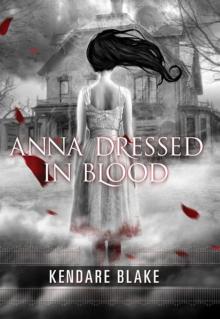 Anna Dressed in Blood
Anna Dressed in Blood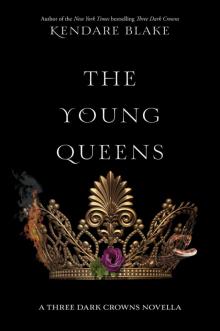 The Young Queens
The Young Queens Queens of Fennbirn
Queens of Fennbirn Antigoddess
Antigoddess The Dogs of Athens
The Dogs of Athens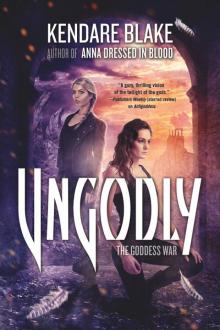 Ungodly
Ungodly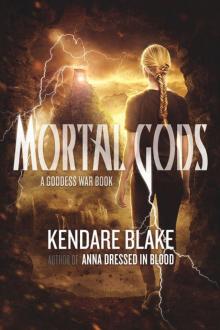 Mortal Gods
Mortal Gods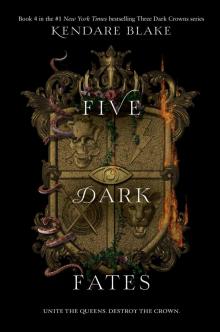 Five Dark Fates
Five Dark Fates Girl of Nightmares
Girl of Nightmares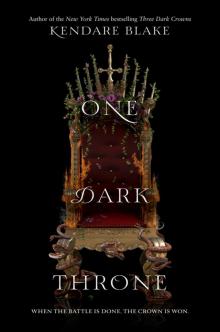 One Dark Throne
One Dark Throne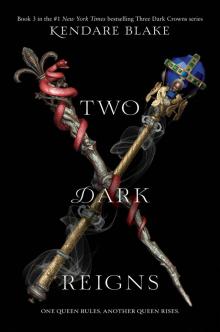 Two Dark Reigns
Two Dark Reigns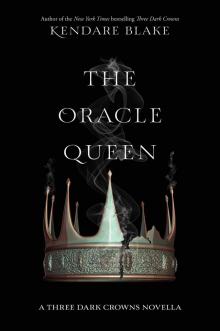 The Oracle Queen
The Oracle Queen Antigoddess gw-1
Antigoddess gw-1